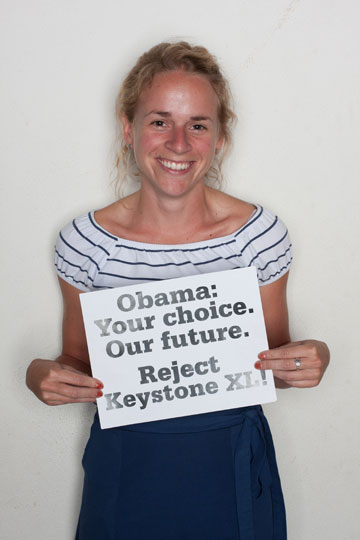View Larger Map
The tar sands as seen from Google Earth near Fort McMurray, Alberta.
Along with Bill McKibben and a small cadre of passionate environmental activists, Kelly Blynn co-founded the climate activism group “350.” 350 exemplifies the power of online networks combined with activism and has coordinated some of the largest and most successful environmental protests in history. The 350 team has organized more than 5,200 events in 181 countries around the world.
Kelly graduated from Middlebury College with a degree in Geography and Environmental Studies and experience coordinating one of the largest university campus environmental activism groups in the United States. Blynn is currently situated in Washington, D.C.
Mongabay: How did 350 begin? How and when did you become involved?
 Kelly Blynn. |
Kelly Blynn: 350 began in 2008 following the release of Jim Hansen’s paper “Target CO2” in late 2007. We wanted to make sure that the outcome of the Copenhagen summit would be measured by civil society based on whether it did enough scientifically to stop climate change. I am one of the co-founders and became involved organizing with my fellow co-founders on our college campus by working to get our university to go carbon neutral.
Mongabay: 350 has emerged as the most active and widespread environmental movement on the planet, existing in 188 countries thanks to the hard work and dedication of the team members and an incredible amount of self-organization by the global public. 350’s demonstration of the effectiveness of social media has been exemplary. Were you surprised by the speed and effectiveness of the social network approach? What are some of the most exciting and unexpected developments in 350’s history?
Kelly Blynn: I think we were surprised to find people actively organized and excited to connect their actions in countries all over the world, in particular countries with low internet connectivity or in repressive regimes. People care about this issue everywhere. There are so many exciting developments, but certainly the groundswell of vulnerable countries supporting the 350ppm target in Copenhagen, and the civil society support we were able to help coordinate to support them. This year, the most exciting development has been taking a fight that supposedly had a pre-determined outcome (the Keystone pipeline) and being able to organize to change that fate.
Mongabay: The 350.org website mentions association with the “Occupy” movement. Could you describe some of the details of this collaboration?
Kelly Blynn: As your readers probably know about local Occupy movements, it takes spending time at the local occupation to get to know people and figure out how to best plug in. Our staff and volunteers spent time at the NYC occupation, and we encouraged our network everywhere around the world to get involved with their local occupation through emails and resources we produced. Lots of informal collaboration on the local level is now continuing.
Mongabay: 350 previously harnessed incredible support during globally-coordinated events such as Earth Hour, as well as contributing to widespread global awareness of climate change in general. Some contemporary analysts, however, suggest that society is in a “post-Gandhi” era in which shame, traditional protest methods, boycotts, and moral suasion are inefficient. What might we expect from future action if global governments continue to ignore the scientific consensus on climate change as well as public pressure?
Kelly Blynn: The initial success in postponing the Keystone XL Pipeline involved the coordination of an unprecedented number of public participants, top scientists, Nobel Peace Prize laureates, indigenous rights leaders, and many others. The pipeline, however, is still under consideration.
Mongabay: If the project is passed does 350 have a backup plan to insure the pipeline is not installed?
Kelly Blynn: The White House just said “no” to the pipeline again, so we’re on top for now, but we aren’t letting the pressure off. When the pipeline was initially delayed, we asked people to pledge their support and willingness to take action if the pipeline construction went forward. We’ll determine what that might look like when that day comes.
Mongabay: Atmospheric levels of carbon dioxide are currently around 390 ppm (parts per million), and the CO2 equivalent of all greenhouse gases is estimated closer to 430ppm. Does 350 have a stance on any of the geoengineering schemes that may be able to actually sequester carbon dioxide?
Kelly Blynn: We believe we have the technology available now that we know is safe, and can be rapidly deployed in a decentralized, locally controlled manner—we feel this is a better approach than gambling on risky technologies that haven’t been tested or proven.
Mongabay: 2011 was filled with exciting developments in globally-networked activism and revolution, and there seems to be a culturally-pervasive theme of major change for 2012. What sort of action can we expect from 350 in the next 12 months?
Kelly Blynn: It’s a secret! Just kidding. We’ve already begun one part of our plan—to take on ending fossil fuel subsidies, which could help cut emissions in half, says one report noted recently in the Washington Post.
Related articles
U.S. media favored Keystone pipeline in coverage
(01/26/2012) A new report by Media Matters finds that U.S. TV and print media were largely biased toward the construction of TransCanada’s Keystone XL Pipeline, which the Obama administration recently turned down. The report finds that guests and quotes were largely in favor of the pipeline in addition to news outlets consistently repeating job figures for the pipeline that have been discredited.
Obama rejects Keystone pipeline, but leaves door open for tar sands

(01/18/2012) The Obama administration today announced it is scrapping TransCanada’s Keystone pipeline after Republicans forced a 60-day deadline on the issue in a Congressional rider. The State Department advised against the pipeline arguing that the deadline did not give the department enough time to determine if the pipeline “served the national interest.” The cancellation of the pipeline is a victory for environmental and social activists who fought the project for months, but Republicans are blasting the administration.
Obama Administration bows to pressure, delays tar sands pipeline
(11/10/2011) In what can only be described as a major victory for green activists, the Obama Administration has announced it will delay a decision on TransCanada’s controversial Keystone XL pipeline for 12-18 months. Notably, putting the decision off until after the last election. The delay comes less than a week after about 12,000 people encircled the White House in opposition to the Keystone XL pipeline, which they argue threatens one of the most important water supplies in America’s heartland and will worsen climate change.